Paracelsus: Physician, Alchemist, Philosopher Well Ahead Of His Time
A. Sutherland - AncientPages.com - Paracelsus (1493 - 1541) - was a Swiss-German botanist, philosopher, astrologer, alchemist, and one of the most influential medical scientists in early modern Europe.
His real name was Philippus Aureolus Theophrastus Paracelsus Bombastus von Hohenheim but he was celebrated as "Paracelsus."
His career differed radically from many of his colleagues.
At sixteen years of age, Paracelsus was already well acquainted with alchemical knowledge. After spending some time at the University of Basle, he led a wandering life, traveled throughout Europe, even visiting Arabia, Egypt, Russia, Finland, and the Arctic region, dispensing powerful wisdom centuries ahead of his time.
"Poison is in everything, and nothing is without poison. The dosage makes it either a poison or a remedy. Paracelsus
Working in the mines of Sigismund Fugger, he acquired valuable knowledge of metals and ores; he also studied diseases of his fellow-workers. Paracelsus had many talents and was gifted by nature. He believed that Nature was the best healer and that the best results could be achieved by natural methods.
Driven by invincible life energy and despite his unhealthy way of life, Paracelsus wrote over ten thousand pages devoted to surgery, alchemy, astrology, and theology.
Due to constant conflicts with his employers and even colleagues, he had not so often any permanent job.
"They drove me out of Lithuania, and Prussia, and Poland…The Dutch did not like me either, nor the schools… but thank God, the patients liked me!”
He was a visionary who considered chemistry the key to the whole universe where God was the divine alchemist who created the world.
This highly controversial scientist had a great knowledge of alchemy, surgery, and medicine and was strongly against superstitions and misconceptions and all authorities.
Paracelsus was a symbol-figure who stood for heroism, but he was also considered a charlatan. Traditionally working doctors accidentally killed dozens of his patients, according to Paracelsus, through their old-fashioned and dangerous treatment of the so-called blood-letting, a practice that Paracelsus firmly opposed.
The art of healing comes from nature, not from the physician. Therefore the physician must start from nature, with an open mind. Paracelsus
In one of his most polemical writings, a book from 1531 with the intriguing title "Paragranum" (Beyond The Seed) Paracelsus states that all physicians who follow Claudius Galenus (AD 129 – 199/217) teachings should be burned at the stake, exposed to cholera infection, drowned in mud or tormented by mosquitoes.
He made claims to manufacture potable gold granting prolonged youth and his claims may have been symbolic for the esoteric doctrine of a Universal Medicine based upon Light - the creative agent, the vibrations of which constitute the movement and life of all things. He deeply believed that medicine is supported by four pillars - philosophy, astronomy, alchemy, and ethics.
Paracelsus was one of the first physicians who gave special importance to using chemicals, minerals in medical treatment as well as opiates as anesthetics in surgery. Paracelsus's works greatly influenced the early Rosicrucians and some of his impressive ideas are startling even today.
Written by – A. Sutherland AncientPages.com Staff Writer
Copyright © AncientPages.com All rights reserved. This material may not be published, broadcast, rewritten or redistributed in whole or part without the express written permission of AncientPages.com
Expand for referencesMore From Ancient Pages
-
 Mysterious And Abnormally Large Burials Found Near The Black Fortress In Armenia – Who Was Buried There?
Featured Stories | Jan 2, 2025
Mysterious And Abnormally Large Burials Found Near The Black Fortress In Armenia – Who Was Buried There?
Featured Stories | Jan 2, 2025 -
 Nidhogg – Dreadful Winged Corpse-Eating Dragon Who Is Enemy Of Asgard And Yggdrasil Tree
Featured Stories | May 9, 2020
Nidhogg – Dreadful Winged Corpse-Eating Dragon Who Is Enemy Of Asgard And Yggdrasil Tree
Featured Stories | May 9, 2020 -
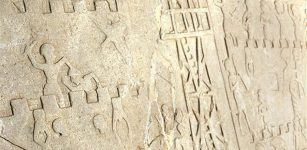 Harput Relief: 4,000-Year-Old Artifact Pushes Back History Of Region By 1,000 Years
Archaeology | Mar 23, 2017
Harput Relief: 4,000-Year-Old Artifact Pushes Back History Of Region By 1,000 Years
Archaeology | Mar 23, 2017 -
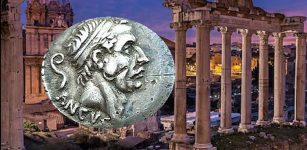 Ancus Marcius: Semi-Legendary Fourth King Of Rome Obliged To Make War To Defend And Expend Territories
Featured Stories | Jul 12, 2019
Ancus Marcius: Semi-Legendary Fourth King Of Rome Obliged To Make War To Defend And Expend Territories
Featured Stories | Jul 12, 2019 -
 On This Day In History: National Hero Paul Revere Warns Of The British Coming – On Apr 18, 1775
News | Apr 18, 2016
On This Day In History: National Hero Paul Revere Warns Of The British Coming – On Apr 18, 1775
News | Apr 18, 2016 -
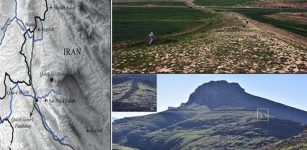 Discovery: Massive Gawro Wall Dated To The Antique Age: Was It A Symbolic Or Defensive Structure?
Archaeology | Nov 9, 2019
Discovery: Massive Gawro Wall Dated To The Antique Age: Was It A Symbolic Or Defensive Structure?
Archaeology | Nov 9, 2019 -
 Stunning Underwater Photos Reveal Secrets Of Legendary Lost City Of Heracleion
Featured Stories | May 4, 2013
Stunning Underwater Photos Reveal Secrets Of Legendary Lost City Of Heracleion
Featured Stories | May 4, 2013 -
 Mysterious People Who Appeared Out Of Nowhere
Featured Stories | Sep 1, 2018
Mysterious People Who Appeared Out Of Nowhere
Featured Stories | Sep 1, 2018 -
 Prehistoric Anomaly On The Tennessee-North Carolina Border Baffles Scientists
Featured Stories | Jul 30, 2024
Prehistoric Anomaly On The Tennessee-North Carolina Border Baffles Scientists
Featured Stories | Jul 30, 2024 -
 New Light On Foodways In The First Cities In Mesopotamia
Archaeology | Nov 21, 2022
New Light On Foodways In The First Cities In Mesopotamia
Archaeology | Nov 21, 2022 -
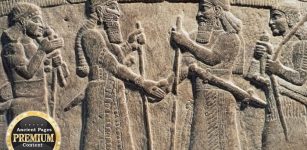 Handshaking Is An Ancient Tradition – When, Where And Why Did We Start To Clasp Hands?
Ancient History Facts | Aug 30, 2019
Handshaking Is An Ancient Tradition – When, Where And Why Did We Start To Clasp Hands?
Ancient History Facts | Aug 30, 2019 -
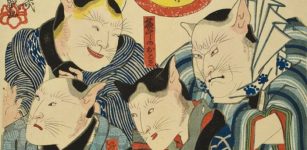 Why Were Actors Painted As Cats By Ukiyo-e Artists In Japan?
Ancient History Facts | Feb 11, 2020
Why Were Actors Painted As Cats By Ukiyo-e Artists In Japan?
Ancient History Facts | Feb 11, 2020 -
 Incredible Ancient Star Map Depicting Our Galaxy Is Hidden In Africa
Ancient Mysteries | Aug 4, 2018
Incredible Ancient Star Map Depicting Our Galaxy Is Hidden In Africa
Ancient Mysteries | Aug 4, 2018 -
 Archaeological Mystery – Why Has Only One Such Puzzling Ancient Object Been Found In Norway?
Ancient Mysteries | Aug 8, 2024
Archaeological Mystery – Why Has Only One Such Puzzling Ancient Object Been Found In Norway?
Ancient Mysteries | Aug 8, 2024 -
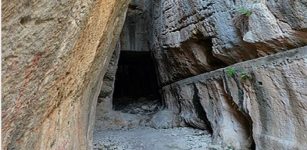 Spectacular Vespasianus Titus Tunnel – An Ancient Roman Engineering Marvel
Ancient Technology | Aug 30, 2018
Spectacular Vespasianus Titus Tunnel – An Ancient Roman Engineering Marvel
Ancient Technology | Aug 30, 2018 -
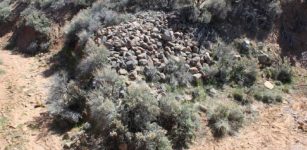 Mountain Meadows Massacre: Real Burial Sites Are Far From The LDS Monument’s Location
News | Sep 21, 2015
Mountain Meadows Massacre: Real Burial Sites Are Far From The LDS Monument’s Location
News | Sep 21, 2015 -
 Hopi Ancestors Witnessed Flying Shields In The Skies Over Palitkwapi – The ‘Red City’
Civilizations | Apr 8, 2017
Hopi Ancestors Witnessed Flying Shields In The Skies Over Palitkwapi – The ‘Red City’
Civilizations | Apr 8, 2017 -
 Ancient Secrets Of Mistletoe – Sacred Celtic Plant With Magical Powers
Ancient Traditions And Customs | Dec 17, 2024
Ancient Secrets Of Mistletoe – Sacred Celtic Plant With Magical Powers
Ancient Traditions And Customs | Dec 17, 2024 -
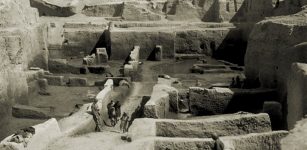 Iraq’s Ancient Kish City Survived The Great Flood – Today It’s Neglected And Lies Buried In Sand
Civilizations | Sep 24, 2015
Iraq’s Ancient Kish City Survived The Great Flood – Today It’s Neglected And Lies Buried In Sand
Civilizations | Sep 24, 2015 -
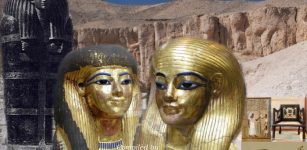 Amazing Tomb Of Yuya And Tjuyu Filled With Ancient Treasures In The Valley Of The Kings
Featured Stories | Jun 2, 2021
Amazing Tomb Of Yuya And Tjuyu Filled With Ancient Treasures In The Valley Of The Kings
Featured Stories | Jun 2, 2021


